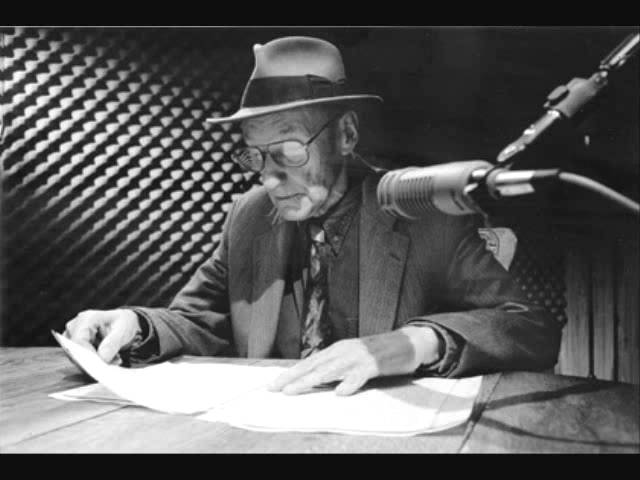Published in 1959, Williams S. Burroughs’ Naked Lunch ranks with other mid-twentieth century books like Henry Miller’s Tropic of Cancer and the works of Jean Genet as literature that sharply divided both critical and legal opinion in arguments over style and in questions of obscenity. Among its disturbing and subversive characters is the sociopathic surgeon Dr. Benway, who inspired the medical horrors of J.G. Ballard and was inspired in turn by Aldous Huxley’s Brave New World. Benway provides some of the more satirical moments in the book, as you can hear in the section below, which Burroughs reads straight with his distinctive nasally Midwestern twang. A short film of the scene (sadly unembeddable), called “Dr. Benway Operates,” has Burroughs himself playing the doctor, in a dramatization that looks like low rent farce as directed by John Waters.
A series of loosely connected chapters that Burroughs said could be read in any order, Naked Lunch seems both fascinated and repelled by the grisly medicalized violence in scenes like those above (one vignette, for example, presents “a tract against capital punishment”). This ambivalence was not lost on writers like Norman Mailer. The highest praise of the novel probably came from Mailer during the novel’s 1966 obscenity trial before the Massachusetts Supreme Court. In one among a handful of literary depositions, including one from Allen Ginsberg, Mailer described Burroughs’ “extraordinary style,” and “exquisite poetic sense.” Despite the fact that its images were “often disgusting,” Mailer called the book “a deep work, a calculated work” that “captures that speech [‘gutter talk’] like no American writer I know.”
Perhaps one of the work’s most damning pieces of criticism comes from the Judicial Officer for the U.S. Postal Service, who called for the book’s banning, appraising the writing as “undisciplined prose, far more akin to the early work of experimental adolescents than to anything of literary merit.” Mailer, Ginsberg, and the book’s other supporters won out, a fact beat essayist Jed Birmingham laments, for a surprising reason: The unbanning of Naked Lunch led to the book’s taming, its gentrification, as it were: “The wild, exuberant offensiveness of the novel fades,” he writes, “in the face of all the legal arguments and the process of canonization.” In fact, the full novel may never have been published at all had it not been for the Post Office in Chicago seizing several hundred copies of The Chicago Review, which contained some few Naked Lunch sections. Hearing of the controversy, French publisher Maurice Girodias hastily threw together a manuscript of the first 1959 text.
And yet, prior to the mid-sixties, the decision to ban Naked Lunch, “even before it was published in book form,” meant “that questions of obscenity and censorship dictated the academic and public reception” of the book. Burroughs commented on the effects of such censorship—using an analogy to “the junk virus”—in part of a new preface to the 50th edition called “Afterthoughts on a Deposition.” The heath risks of opiates “in controlled doses,” he writes,“maybe be minimal,” yet the effects of criminalization are outsized “anti-drug hysteria,” which “poses a threat to personal freedoms and due-process protections of the law everywhere.”
Since the novel’s vindication, critical consensus has centered around sober, reverent judgments like Mailer’s—and to some lesser extent Ginsberg’s terse, irritable testimony. While there are still those who despise the book, it’s significant that Burroughs’ work—which the Washington Post called the first of his “homosexual planet-operas”—has achieved such widespread admiration amidst the notoriety. The novel deals in themes we’re still adjudicating daily in courts legal and public some 55 years later, pointing perhaps to the continued gulf between the thoughts and aims of the reading public and those of hysterical authoritarians and “the media and narcotics officials,” as Burroughs has it. After all, at its 50th anniversary in 2009, Naked Lunch was pronounced “still fresh” by such mainstream outlets as NPR and The Guardian, evidence of its persistent power, and maybe also of its domestication.
Clips of Burroughs reading Naked Lunch can also be found on this Columbia University site.
Related Content:
William S. Burroughs Reads His First Novel, Junky
William S. Burroughs on the Art of Cut-up Writing
550 Free Audio Books: Download Great Books for Free
Josh Jones is a writer and musician based in Durham, NC. Follow him at @jdmagness



Leave a Reply